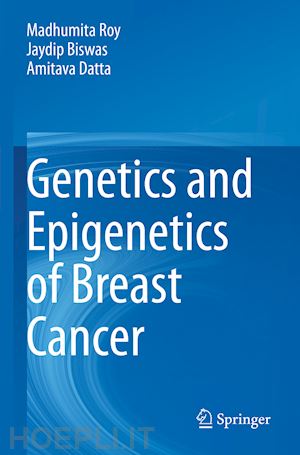

Questo prodotto usufruisce delle SPEDIZIONI GRATIS
selezionando l'opzione Corriere Veloce in fase di ordine.
Pagabile anche con Carta della cultura giovani e del merito, 18App Bonus Cultura e Carta del Docente
This book discusses the contribution of genetics and epigenetics alterations in the initiation, development, and recurrence of breast cancer. It also reviews the potential of translating the epigenetic alterations into diagnosis, prognosis, and breast cancer therapy. The initial chapters explore the epigenetics, etiology, and conventional treatment strategies for breast cancer. The subsequent chapters discuss the genetic landscape and cover three main epigenetic modulation mechanisms; histone modification, DNA methylation, and miRNA silencing. Further, the book explores the potential of epigenetic drugs in treating breast cancer. Lastly, it covers the phytochemicals targeting epigenetic modulators in breast cancer treatment. This book is an essential source for researchers and practitioners interested in exploring the potential of epigenetics modulators in breast cancer treatment.
Dr. Madhumita Roy is currently the Assistant Director and Head of the Department of Environmental Carcinogenesis and Toxicology, Chittaranjan National Cancer Institute, Kolkata. Her research focuses on cancer biology, environmental toxicology, and identification of important tumor bio-markers, and chemo-enhancing efficacy of tumor cells by plant-derived molecules. She has published over 80 research articles in journals of high repute. She is a life member of several societies, such as the Environment Mutagen Society of India (EMSI), Indian Association for Cancer Research (IACR), Electron Microscope Society of India, Indian Science Congress Association, All India Congress of Cytology & Genetics, and the Society of Nutraceuticals & Chronic Diseases.
Dr. Jaydip Biswas completed his MBBS, MS(Master of Surgery in general surgery) and Diploma in Medical Therapeutics from University of Calcutta, FRCS Ed from the Royal College of Surgeons of Edinburg, FACSfrom the American College of Surgeons and PhD in Medicine from University of Calcutta. He has worked in various roles in several hospitals, and in particular at the Chittaranjan National Cancer Institute, Kolkata, where he was an officer in charge, surgeon, and director between 2013 and 2018. He has received further medical training Memorial Sloan Kettering Cancer Centre, New York, and Manchester University Hope Hospital, Salford, UK and Christie Hospital, UK, in surgical oncology. He has extensive clinical expertise in different types of elective, emergency general surgical procedures including different types of cancer surgery, Head & Neck Reconstructive procedures, Breast Reconstruction and GI Endoscopy. He has taught many courses on surgical oncology at Chittaranjan National Cancer Institute. He has extensive research experience in various cancers and published over 70 papers in leading national and international journals in cancer, in particular on the role of phytochemicals in cancer treatment. He has also conducted many phase II and phase III clinical trials for potential therapies by drugs and phytochemicals in various cancers.
Dr. Amitava Datta is currently a professor at the Department of Computer Science and Software Engineering at the University of Western Australia. He has completed his M.Tech and PhD in Computer Science at the Indian Institute of Technology, Madras. He pursued postdoctoral research at the Max Planck Institute for Computer Science and University of Freiburg, both in Germany. He was a Visiting Professor at the University of Freiburg and is currently a Visiting Professor at the University of Life Sciences, Warsaw, Poland, and South West University, China. His scientific interests include computational molecular biology, data mining and parallel and distributed computing, and his computational molecular biology research focuses on RNA structural biology and miRNA gene and target prediction, particularly in relation to cancer biology. He has published over 150 research papers in respected international journals.











Il sito utilizza cookie ed altri strumenti di tracciamento che raccolgono informazioni dal dispositivo dell’utente. Oltre ai cookie tecnici ed analitici aggregati, strettamente necessari per il funzionamento di questo sito web, previo consenso dell’utente possono essere installati cookie di profilazione e marketing e cookie dei social media. Cliccando su “Accetto tutti i cookie” saranno attivate tutte le categorie di cookie. Per accettare solo deterninate categorie di cookie, cliccare invece su “Impostazioni cookie”. Chiudendo il banner o continuando a navigare saranno installati solo cookie tecnici. Per maggiori dettagli, consultare la Cookie Policy.